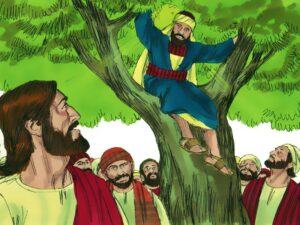A One-Man Jubilee
Luke 18:14 – 19

What’s the deal with Pharisees and tax collectors? Pharisees were lovers of Israel, lovers of the law. Patriots. True believers. They tried to build a wall around the Law.
Tax collectors were Jews working for the Roman government – they were traitors to their nation and their faith. Like Jedi joining Darth Vader. And yet when we deal with Jesus, we have Pharisees and tax collectors.
In last Sunday’s gospel reading, “A Pharisee and a tax collector went to the temple to pray.” What’s Jesus doing here?
According to Jewish New Testament scholar Amy J. Levine, Jesus’ first-century Jewish listeners would have been surprised, shocked, and suspicious of the story (Amy-Jill Levine, Short Stories by Jesus).
Pharisees, religious leaders of that time, did not hang out with tax collectors. And tax collectors, people not known for their moral living, did not hang out in the temple, the place the faithful came to rest in God’s presence. But hold your horses! Behind the scenes, there’s evidence that tax collectors and Pharisees engaged in a profitable business. In the KJV of the Bible, Matthew tells us that Pharisees devoured widows’ houses – foreclosed on widows unable to pay property taxes. The tax collectors and Pharisees were splitting ill-gotten profits at the expense of one of God’s protected classes: Widows. They were putting the cloak of religious respectability over the cancer of corruption. When religious people and political people make an alliance somebody gets the short end of the stick.
I need to show you something that might shock you. Look at the end of the story of the Pharisee and tax collector praying in the Temple: “To you, I say, the tax collector is justified, alongside the Pharisee” (Levine, Short Stories of Jesus). Not rather than the Pharisee, but with the Pharisee. The Greek preposition para also means “alongside.” After they prayed in the temple, both the Pharisee and the tax collector were justified. God justifies both even as we routinely condemn others. When we say “No mercy,” God says, “Mercy.
And the one tax collector that has received the most attention from preachers is Zacchaeus. He’s the guy that makes all tax collectors seem like saints instead of government Mafia. Tax collectors are often spoken about in sermons and in Sunday school lessons as if they were always our repentant heroes. People are too savvy to ever identify with a Pharisee, but we jump to be like Zacchaeus.
We have all those Sunday school lessons that taught us to love Zacchaeus.
Sunday school taught us to treat him like a small child. Zacchaeus seems soft and cuddly like Baby Yoda.
Zacchaeus was a wee little man
And a wee little man was he
He climbed up in a sycamore tree
The Lord he wanted to see
The Lord passed by and said
“Zacchaeus, you come down from there
‘Cause I’m going to your house today
‘Cause I’m going to your house today”
What was wrong with Zacchaeus was something deeply wrong. Zacchaeus couldn’t go from traitor and thief to a good person with an apology. He had lived his life taking advantage of poor people – selfish, narcissistic, greedy, self-centered, lacking in empathy.
Here’s what true repentance looks life. The man who lived by saying, “What’s yours in mine,” now says, “What’s mine is yours.” Zacchaeus goes from “What can I take from others, how can I bleed the government dry” to “What can I give to others, do for the nation?”
First, Zack says he will give back half of his money, suggesting that he had been charging at least double the actual government tax rate. Then Zacchaeus says, “If I have defrauded anyone, I will pay back four times as much.” Zacchaeus is reluctant. “If I have defrauded” suggests that he may not know for sure or that knowing he is unwilling to admit outright fraud. “If I have offended anyone, I’m sorry.”
People don’t like to admit fraud. Corporations pay millions of dollars in fines for defrauding customers, but in the legal system, the corporation doesn’t admit any wrongdoing. The tobacco companies agreed to pay billions for damages caused by smoking, but no admission of wrong. The petro-chemical companies in Louisiana agreed to a settlement of millions of dollars but no admission of poisoning the water of the Bayou State.
Zacchaeus defrauded friends and family. Bernie Madoff of the gospels – a fraud. Zacchaeus had charged four times the legal tax rate. If a man owed a $1,000, Zacchaeus charged him $4,000. He gave the Roman governor the $1,000 and he kept the $3,000 for himself. This made Zacchaeus a wealthy man not a wee lad.
That leads us to the major overriding issue in the story. Repentance is reparations. God believes in reparations. God’s name for reparations is Jubilee. Zacchaeus is a one-man Jubilee. Look at Zacchaeus enact Jubilee.
I’m not condemning you if you rant about reparations, I am warning you that reparations are in God’s will. Jubilee is coming and when you steal land from people, the Bible says the original landowners will be coming for their property.
Let me tell you a little history lesson. We gave trinkets for Manhattan. We paid France, not Native Americans, for Louisiana. The government enclosed Native Americans on reservations. The government took land and property from Japanese Americans and imprisoned them. When there’s something to grab, we are big grabbers. This is our history.
I don’t know why, but I think of the great Apache chief, Geronimo. They locked him in a cell in Fort Lawton, Oklahoma. The site is now a national park. You can visit the place where Geronimo was jailed. There’s a bare dirt floor in the cell and one little barred window way up high. And that great chief of the Apache, the warrior raised in freedom on the land of his people, was stuck there. Guess what? You can still see a trench in the dirt floor. Geronimo paced back and forth, back and forth, until his footprints made a trench.
And somewhere the spirit of Geronimo wants his land back again.
Why do I think like this? Because I am a Bible man. And I know that God hears the cry of the oppressed, even after they are long dead. “The Israelites groaned under their slavery, and cried out. Out of the slavery their cry for help rose up to God. God heard their groaning.” Jubilee is in God’s DNA.
What is Jubilee? It’s the Bible word for crazy talk, for the most distinctive mark of biblical ethics. Every fifty years you must give back to the people the land they have lost in the rough and tumble economy of competition. Everybody returns property, everybody cancels debts, everybody breaks off the mad scramble of accumulation. Life consists in sharing well not in getting more. Walter Brueggemann, Old Testament scholar, reminds us that Jubilee is not some pipe dream but is a material, concrete, actual economic act.
Jesus tells us, “I am the Jubilee. I am going to enact it.” Here is a different, large vision of the future. Jubilee is not about inflation, recession, or which side gets lucky enough to govern during an era of prosperity. Jubilee is about sharing and giving back. Jubilee is when politicians stop worrying about getting re-elected and give themselves for the good of all the people.
But there’s never been a Jubilee – not in all of history. Well, I count Zacchaeus as the only occurrence of Jubilee in history – a one man Jubilee.
There’s no way around Zacchaeus: Repentance means reparations.
The reality is there will be a Jubilee. Will we participate? Are there reparations you need to offer to make things right with people you have wronged? I’m asking about our own need for repentance on an individual basis, a local basis.
Our turn for Jubilee has arrived. How can we think of deep and bold gestures of Jubilee, costly enough and significant enough to impact our city that will make neighborliness possible in new ways. This has nothing to do with Democratic or Republican politics. It has to do with my conviction that the gospel needs to invade a city where we are becoming a jungle of fear and danger and will keep on that way until we stop thinking about how to get ours, and until we have leaders who are not interested in getting re-elected or enriching themselves, but our determined to make neighbors of the haves and the have nots in a Jubilee economy.
My vision for this church is that we will all come back together as part of our Jubilee, forgiving one another for all insults, hurts, and harsh words. We will start this Jubilee by coming home to EFC and sharing our material goods with the church. I want you to think and pray about Jubilee starting here with us. We have to start somewhere and right here is as good a place as any. Amen.











